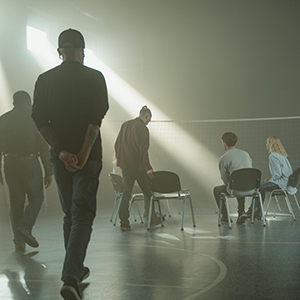Attachment insecurity predicts outcomes in an ACT-CBT group therapy for adults in a physical rehabilitation centre

Accepted: August 23, 2022
Appendix: 130
HTML: 34
All claims expressed in this article are solely those of the authors and do not necessarily represent those of their affiliated organizations, or those of the publisher, the editors and the reviewers. Any product that may be evaluated in this article or claim that may be made by its manufacturer is not guaranteed or endorsed by the publisher.
Authors
Adapting to chronic illness or disability is accompanied by acute and ongoing illness stressors. Psychological factors such as emotional distress and low self-efficacy are common experiences in chronic illness and disability and interfere with adaptation and psychosocial outcomes such as health-related quality of life. Transdiagnostic group psychotherapy may provide a parsimonious approach to psychological treatment in rehabilitation care by targeting shared illness stressors across mixed chronic illnesses and disabilities, and shared processes that maintain psychological symptoms. Attachment theory may explain individual differences in outcomes and help identify individuals at risk of poor health-related quality of life trajectories. Adults (N=109) participated in an 8-week process-based ACT-CBT psychotherapy group at a tertiary care physical rehabilitation centre between 2016 and 2020. Participants completed measures of emotional distress, self-efficacy, health-related quality of life, and attachment at pre- and post-treatment. Multilevel analyses indicated that patients improved on most outcomes at post-treatment. Attachment anxiety at pre-treatment was associated with more positive outcomes. Reliable change indices suggest clinically meaningful change for the majority of participants, but most were not recovered. Results provide proof-of-concept for the transdiagnostic group intervention and suggest that a longer course of treatment may be clinically indicated. Results warrant replication with larger and more diverse samples, and more robust designs.
How to Cite

This work is licensed under a Creative Commons Attribution-NonCommercial 4.0 International License.
PAGEPress has chosen to apply the Creative Commons Attribution NonCommercial 4.0 International License (CC BY-NC 4.0) to all manuscripts to be published.
Similar Articles
- John S. Auerbach, The contributions of Sidney J. Blatt: a personal and intellectual biography , Research in Psychotherapy: Psychopathology, Process and Outcome: Vol. 20 No. 1 (2017)
- Guillermo de la Parra, Paula Dagnino, Camila Valdés, Mariane Krause, Beyond self-criticism and dependency: structural functioning of depressive patients and its treatment , Research in Psychotherapy: Psychopathology, Process and Outcome: Vol. 20 No. 1 (2017)
- Brigitte Holzinger, Franziska Nierwetberg, Larissa Cosentino, Lucille Mayer, DreamSenseMemory - a Gestalt-based dream-work approach embracing all our senses , Research in Psychotherapy: Psychopathology, Process and Outcome: Vol. 24 No. 2 (2021): SPECIAL ISSUE "Working on dreams, from psychotherapy to neuroscience"
- Claudia Capella, Loreto Rodríguez, Estrella Azócar, Ximena Lama, Lucía Núñez, Daniela Águila, Camila Gomez, Macarena Espeleta, Vania Vasquez, Psychotherapeutic change in children and adolescents who have been sexually abused: a model from participants’ perspectives , Research in Psychotherapy: Psychopathology, Process and Outcome: Vol. 25 No. 1 (2022)
- Federica Bonazza, Lidia Borghi, Eugenia Cao di San Marco, Kyrie Piscopo, Francesca Bai, Antonella d’Arminio Monforte, Elena Vegni, Psychological outcomes after hospitalization for COVID-19: data from a multidisciplinary follow-up screening program for recovered patients , Research in Psychotherapy: Psychopathology, Process and Outcome: Vol. 23 No. 3 (2020)
- Elizabeth Li, Chloe Campbell, Nick Midgley, Patrick Luyten, Epistemic trust: a comprehensive review of empirical insights and implications for developmental psychopathology , Research in Psychotherapy: Psychopathology, Process and Outcome: Vol. 26 No. 3 (2023)
- Margarida Pedroso de Lima, Isabel Albuquerque, Paulo Jorge Martins, António-José Gonzalez, Personal Projects Analysis as an idiographic approach in psychotherapy: an exploratory study , Research in Psychotherapy: Psychopathology, Process and Outcome: Vol. 26 No. 1 (2023)
- Valeria Condino, Annalisa Tanzilli, Anna Maria Speranza, Vittorio Lingiardi, Therapeutic interventions in intimate partner violence: an overview , Research in Psychotherapy: Psychopathology, Process and Outcome: Vol. 19 No. 2 (2016)
- Jordan Bate, Angelica Tsakas, Facilitative interpersonal skills are relevant in child therapy too, so why don’t we measure them? , Research in Psychotherapy: Psychopathology, Process and Outcome: Vol. 25 No. 1 (2022)
- Maria Eugenia Moneta, Horst Kaechele, A theoretical and clinical perspective of an embodied view in psychotherapy of somatic symptoms disorders , Research in Psychotherapy: Psychopathology, Process and Outcome: Vol. 26 No. 2 (2023)
<< < 3 4 5 6 7 8 9 10 11 12 > >>
You may also start an advanced similarity search for this article.

 https://doi.org/10.4081/ripppo.2022.634
https://doi.org/10.4081/ripppo.2022.634




